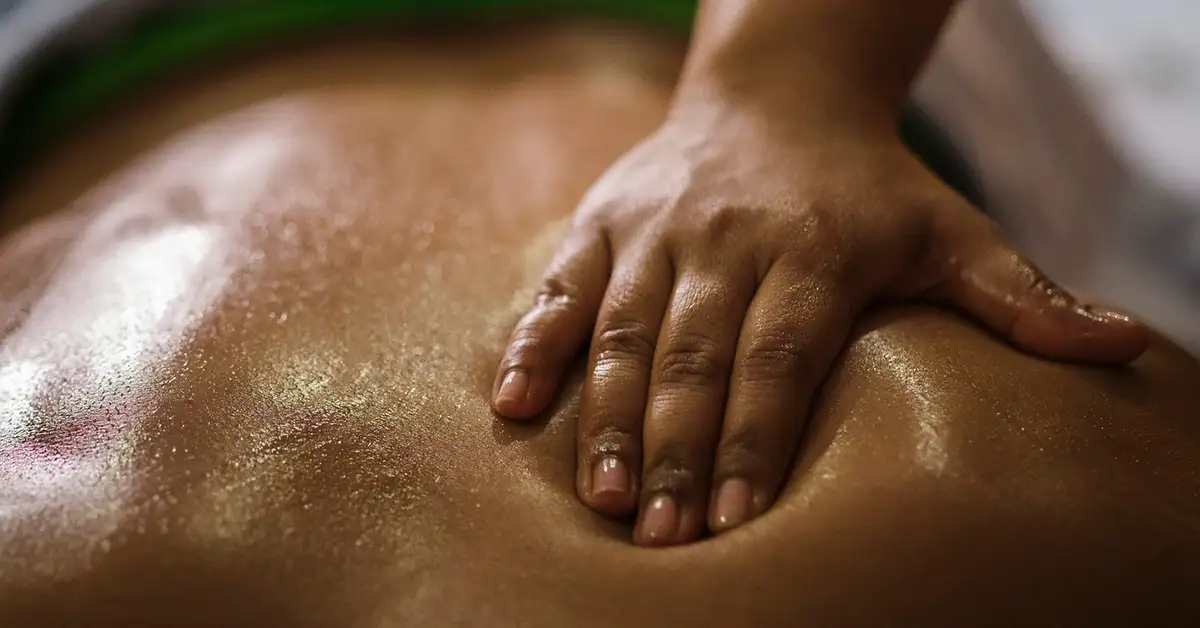
Deep Tissue Massage
Deep Tissue Massage is used for chronic aches, pain, and contracted areas such as a stiff neck and upper back, lower back pain, leg muscle tightness, and sore shoulders.
How Does It Work?
Chronic muscle tension or injury adhesions (bands of painful, rigid tissue, “knots”) can develop in muscles, tendons, and ligaments. Adhesions can disrupt circulation and cause pain, restricted movement, and inflammation. Deep tissue massage physically breaks down these adhesions to alleviate pain and restore normal movement. To do this, the massage therapist uses massage oil and often uses direct deep pressure. Muscles should be relaxed for the therapist to reach the deeper muscular structure.
Your massage therapist will start your massage with lighter pressure to help warm up your tissues and muscles before moving to deeper pressure. A massage technique called stripping is often used. This is when deep pressure is applied along the entire length of your muscle fibers, going against the grain of your muscle to help break up adhesions.
Benefits
Deep tissue massage can benefit your physical, emotional, and mental health.
Provides Stress Relief
Like other types of massage, deep tissue massage offers a relaxing experience that can help you unwind and destress from your life. It provides clinical stress relief, lowering cortisol levels, the hormone responsible for stress.
Deep tissue massage also lowers your blood pressure and heart rate. As muscle tension eases, your heart rate and blood pressure decrease, reducing the stress on your body.
Massage also increases the amount of serotonin and dopamine produced in your body. These neurotransmitters produce feelings of calm and well-being.
Reduces Your Pain
Deep tissue massage can reduce chronic back, neck, and body pain caused by muscle tension. Research shows that this type of massage is as effective as taking non-steroidal anti-inflammatory pain in reducing chronic low back pain in patients.
Helps Break Up Scar Tissue and Increase Mobility
Scar tissue can cause stiffness and pain throughout your body. Deep tissue massage treatments use techniques like stripping to help break up your scar tissue. As your scar tissue dissolves, you’ll experience increased mobility and ease of movement.
Massaging also increases blood flow and lymphatic circulation, promoting healing and mobility in the affected area. If you’re recovering from an injury or surgery, you may want to consider deep tissue treatments to prevent scar tissue from forming.
Helps Treat Arthritis
Many forms of arthritis include symptoms of pain and stiffness in the joints and connective tissues. This can limit an arthritis patient’s range of motion and mobility, causing chronic pain and problems sleeping.
The increased pressure can help alleviate pain and muscle tension caused by arthritis. Massage therapy increases joint mobility, reducing stiffness and making it easier for you to move around. Improving the overall comfort of patients with arthritis can also give them better sleep quality, making it easier to fall and stay asleep during the night.
Heals Injured Muscles
Muscles get injured if they’re twisted or strained the wrong way. A deep tissue massage can help stretch tight muscles and increase blood flow to ease muscle tension and promote healing. The deeper movements increase the circulation of your lymphatic system, which helps filter out substances like lactic acid and helps your muscles recover.
This massage technique is used by athletes and others who suffer sports-related injuries. It helps to heal their muscles faster and can be used after workouts to reduce muscle soreness and fatigue.
Conditions Deep Tissue Massage Helps Treat
People with certain medical conditions will experience improvements in their health due to the benefits of deep tissue massage.
These conditions include:
- Fibromyalgia
- Sciatica
- Plantar Fasciitis
- Chronic low back pain
- Arthritis patients
- Anyone suffering from a sports injury
- Other connective tissue injuries like tendonitis
Side Effects
Getting a deep tissue massage is safe, but you may experience mild side effects. Feeling lingering soreness for a day or two following your massage is common.
Your muscles may not be used to manipulation through massage, causing a low amount of discomfort. Your muscles might feel sore, similar to after a vigorous workout.
Any discomfort shouldn’t last more than a few days. Treat any soreness with a heating pad or cold compress for temporary relief.
Who Shouldn’t Get a Deep Tissue Massage?
It is not safe for everyone. The firm pressure can cause injuries to people with osteoporosis and cancer that’s spread to their bones.
Check with your doctor before getting a deep tissue massage if:
- You have a history of blood clots
- You have a bleeding or blood clot disorder like hemophilia
- You’re taking blood thinners
- You have cancer or are undergoing cancer treatments like chemotherapy or radiation
- You’re pregnant
Your condition may disqualify you from receiving a deep tissue massage, but you may still benefit from other forms of massage therapy that use gentler techniques.
Deep Tissue vs. Swedish Massage
While deep tissue massage uses firm pressure to target chronic tension and adhesions, Swedish massage is gentler and focused on relaxation. If you’re unsure which is best, consider your goals—relief from pain and stiffness often points to deep tissue, while stress relief might make Swedish the better fit.
Conclusions
Deep tissue massage is more than just a massage with deep pressure. The goals and techniques are different from those of a Swedish massage. While it may help with certain conditions, remember that massage doesn’t always have to hurt or make your body sore to be effective. Communicate with your massage therapist to get the most out of your massage.
Consider getting a deep tissue massage if you suffer from chronic pain or muscle tension. The firm massage techniques used in this therapy are designed to reduce your stress levels while easing muscle stiffness.
Learn More About Deep Tissue Massage
Deep tissue massage is more than just firm pressure — it helps relieve chronic pain, break up adhesions, and restore healthy movement. Want to know what to expect during a session and how it can be tailored to your needs?




